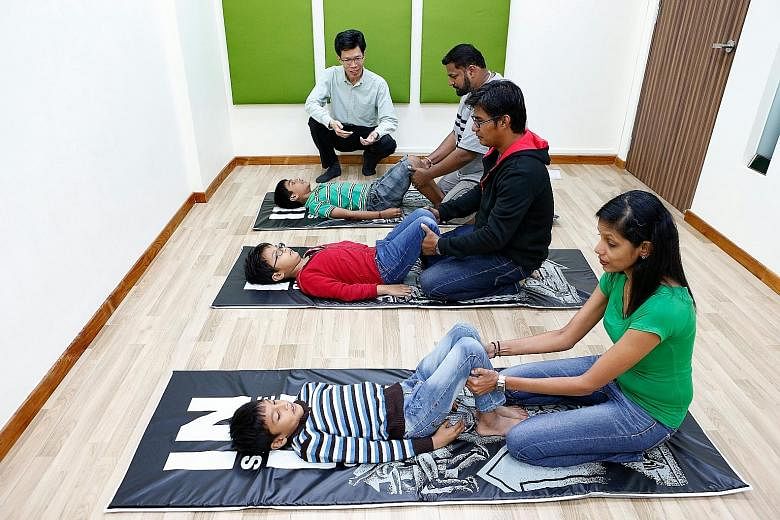To stimulate brain development, some parents hold the feet or legs of their children and rock them back and forth.
It is believed that doing certain body movement exercises can deliver the intense stimulation needed for neurons in the brain to link up.
Over the last decade, Care Corner Singapore has been offering a KidsBright brain development programme for children with learning difficulties. These children could have conditions such as autism, attention deficit hyperactivity disorder (ADHD), dyslexia or problems with memory and speech.
Some of these children may have had insufficient sensory stimulation such as movement or touch when they were young, and hence have poor memory or short attention spans now, said the clinical director of Care Corner's Educational Therapy Service, Mr Issac Tan.
Research has proven the effectiveness of body movement exercises on the brain. A British study on 60 children in 2000 found that those with reading difficulties made significant gains after performing a movement sequence.
Care Corner's KidsBright programme also includes two other research-based methods.
A British study on 300 kids in 2007 found that common food additives, such as artificial colourings and preservatives, increase hyperactivity and reduce attention spans. So Mr Tan recommends that parents of children in KidsBright cut down on tidbits, ice cream or drinks that have preservatives such as sodium benzoate or tartrazine.
He also encourages them to add certain minerals, vitamins and omega-3 fatty acids to their diet.
The last method involves the solving of maths questions within a time limit as a form of mental training.
Some 400 children, mostly referred to the centre by schools, childcare centres, hospitals and family service centres, have gone through the six-month programme so far. It costs $260 a month and low-income families can apply for a subsidy of up to 90 per cent.
According to ratings by parents, 85 per cent of children with ADHD and other learning difficulties improved in at least two out of 10 areas measured under the programme, such as reading ability, memory and attention levels.
"The KidsBright programme's drug-free approach, using mental training, movement exercises and nutrition supplements, is a good alternative to medication treatment," said Mrs Bella Chin, president of Society for the Promotion of ADHD Research and Knowledge.
A parent, who wanted only to be known as Mr Ang, said he had seen significant changes in his nine-year-old son within a month.
"In the past, he would walk around the class every five minutes. Now he can sit still for an entire lesson which lasts 45 minutes," the marine engineer said. "His Chinese results surged and he is able to maintain eye contact with people and socialise more with his peers."
Mr Ang, 43, whose son has Asperger's syndrome, added: "Parental support is the most important so it is great that they train parents to be involved as well."
Janice Tai


